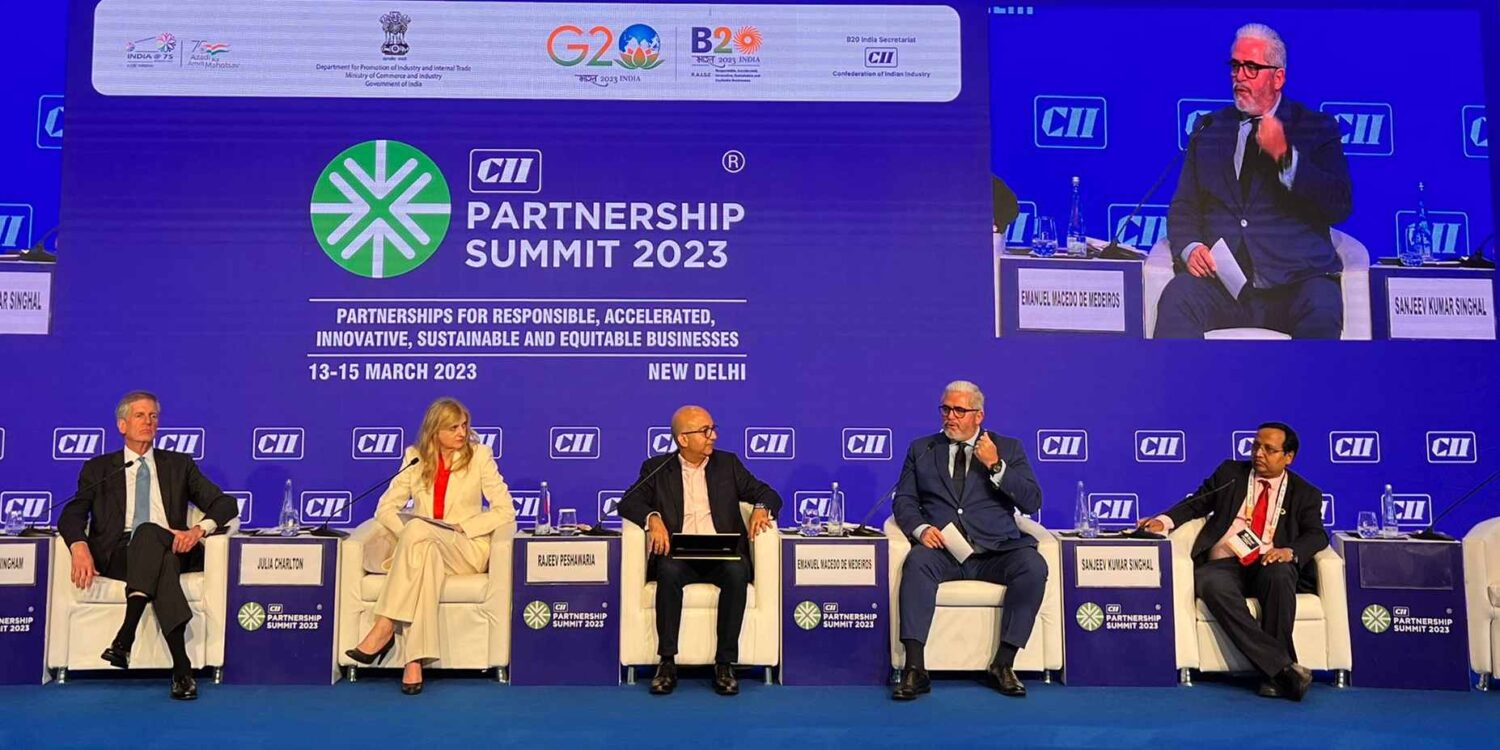Emanuel Macedo de Medeiros, SIGA Global CEO, urged the world’s business leaders to embrace the vision and mission of the Sport Integrity Global Alliance and follow the example of organisations that already adopted best practices in the area of integrity and accountability.
A B20 member in his personal capacity, SIGA’s CEO created a strong impact among the participants of the 28th edition of the Partnership Summit, organised by the Confederation of Indian Industry under the Indian presidency of the G20/B20.
During the panel “Good Corporate Governance – Imperative for ESG Compliance”, Emanuel Macedo de Medeiros emphasised the importance of acting immediately to save the planet – “There is no plan B for Earth. The time is now! If not now, when?” he asked. Emanuel Macedo de Medeiros also flagged how Sport can reform itself and be a dynamo for global change:
“Sport has a huge role to play in creating responsible, accelerated, innovative, sustainable, and equitable business. To meet the mounting challenges ahead and deliver its invaluable social, cultural, educational, and economic function in today’s society and global economy and, at the same time, contribute to a truly sustainable world, Sport must lead by example. Sport needs to govern itself and operate under the highest integrity standards.
This is what the Sport Integrity Global Alliance is about and is committed to. We invite Sport and the wider industry to walk the talk. And this means implementing our Universal Standards and being accountable by going through our independent Rating System (SIRVS). We invite all like-minded organisations to join our global movement and be a driving force for the much-needed and long overdue cultural change.”
Rajeev Peshawaria, CEO of Stewardship Asia Centre and Temasek Trust, moderated the session, which emphasised the significance of effective corporate governance and examined ways to guarantee the implementation of impactful ESG frameworks for attaining long-term viability and sustainability. Rajeev Peshawaria stated that “while regulations, incentives, and cheaper capital are all important drivers of behaviour, the real champion of the environmental sustainability” is “leadership-inspired action“, and the way organisations include in their business plans “genuine desire and persistence to create a collective better future for stakeholders and society.”
Sanjeev Kumar Singhal, Central Council Member, Chairman, Auditing and Assurance Standards Board, Vice Chairman, Sustainability Reporting Standards Board, The Institute of Chartered Accountants of India (ICAI), shared his optimism:
“India is moving in the right direction with respect to the regulation of ESG information. BRAR assurance is likely to be made mandatory soon in a phased manner which will help avoid greenwashing. ICAI has developed the world’s first-ever Assurance standard on sustainability information and is building capacity in the profession.”
Julia Charlton, Founder & Principal Partner, Charltons Law, spoke about India’s long history of engagement with sustainability and India’s leadership role in the ESG conversation between developed countries and the rest of the world. She also urged corporate boards to lead from the top on ESG engagement and “walk the talk“. At the same time Julia raised the prospect of legislative change as the most effective way to effect real and lasting change in relation to ESG. Julia also highlighted the need for change in leadership in the corporate world, which may require legislation for ESG codes, the percentage of women on boards and companies taking responsibility for the future of sustainability.
Nelson Cunningham, Vice Chair and Co-Founder, McLarty Associates (USA), expressed concerns about inconsistency in regulation:
“Regulation is a critical part of ensuring ESG compliance. EU, US, Japan and other important national authorities will seek to mandate ESG goals. The challenge for market participants is that these regulatory regimes are likely to be inconsistent and even contradictory. Whose rules to follow will become the paramount question. Speaking from the United States, because of wide political disagreement over whether ESG goals are legitimate, US regulators are likely to lag the EU and others. This will add to global uncertainty at a time when consistency is required“.
Member of the “B20 India Task Force on Inclusive GVCs for Resilient Global Trade and Investment”, Emanuel Macedo de Medeiros is participating on Wednesday, 15 March, in the second meeting of the task force.
Click below to watch Emanuel Macedo de Medeiros’ opening remarks.
Click here to watch the session.
– THE END –
ABOUT SIGA
SIGA is the world´s leading organisation for Sports Integrity. Supported by more than 200 international multi-industry supporters, we are creating a whole new landscape for the global sports industry by promoting the implementation of the highest integrity standards and delivering independent global rating and certification for Sport.
Funded by its members, SIGA is the only organisation to bring together all key stakeholder groups – Sport, Government, International Organisations, Global Business and Civil Society – from every region in the world, around one critical, fundamental Cause: to foster greater Integrity throughout Sport.
SIGA is headquartered in Geneva, Switzerland, as a non for profit association, funded by its members, and comprises of the following continental subsidiaries: SIGA AMERICA, SIGA EUROPE and SIGA LATIN AMERICA.
Click on the hyperlinks for the list of SIGA Members and Committed Supporters and SIGA Partners.
For more information on SIGA, including its vision, mission and reform agenda, please refer to the website: www.siga-sport.com.
To contact SIGA, please email: [email protected].

